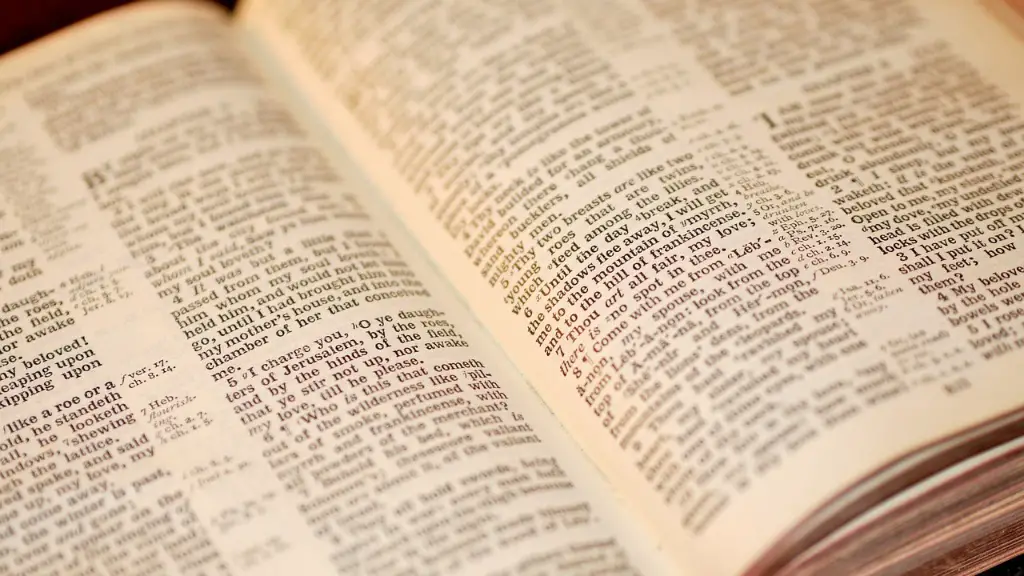Predestination is a theological concept which states that God had already predetermined the fate of all souls before they were born. This belief can be traced back to the writings of St. Augustine of Hippo in the 4th century. In the Christian Bible, the concept of predestination can be found in both Old and New Testaments. In the Old Testament, the Israelites believed that their God had preordained a destiny for them. This idea was further reinforced in the New Testament through the teachings of the Apostle Paul.
In Paul’s letter to the Romans, he states that those who do good things will be rewarded and those who do evil will be punished. Paul’s teachings are based on the concept of predestination, that God has already decided the fate of each individual before they were born. Paul’s teachings are also the basis of the Protestant Reformation and of Calvinism, both of which emphasize that God’s will is the overriding factor in salvation.
The concept of predestination is also addressed in the Book of Ephesians. Here, God’s will is seen as the ultimate factor in determining one’s fate. This is seen in the passage, “For we are his workmanship, created in Christ Jesus for good works, which God prepared beforehand, that we should walk in them” (Ephesians 2:10). This passage emphasizes that God predetermined our paths in life before we were even born.
Another important Bible passage which addresses the concept of predestination is Romans 8:28-30. This passage states, “We know that in everything God works for good with those who love him, who are called according to his purpose…For those whom he foreknew he also predestined to be conformed to the image of his Son, in order that he might be the first-born among many brethren.” Here, the idea of predestination is discussed, with God having predetermined the fate of those who love Him.
Finally, the Bible also mentions the concept of predestination in the Book of Revelation. In Revelation, God is said to have preselected certain individuals to receive his divine blessing and to be saved from perishing. This reinforces the idea of predestination, as it implies that God has chosen who will be saved and who will be damned. This idea is further reinforced in John Calvin’s teachings, where a particular type of predestination is believed to be the governing factor in salvation.
History of Predestination in Christianity
The history of predestination in Christianity dates back to the primitive Church, where it was believed that God had predestined the fate of souls since the beginning of time. This idea of predestination was further strengthened by the writings of St. Augustine of Hippo in the 4th century, who popularized the concept among Christian theologians. His writings were later reinforced by the writings of Luther and Calvin, which further solidified the concept of predestination as a core doctrine in Christianity.
St. Augustine of Hippo’s teachings formed the basis for the Protestant Reformation. In his writings, he argued that God had predetermined the fate of souls in the afterlife and that salvation was a matter of divine grace. His teachings were further reinforced in the writings of Martin Luther, who stated that those who were predestined to be saved will be delivered from death and damnation.
Calvin’s teachings further developed the concept of predestination. Calvin held the view that there were two types of predestination: one that was based on good works and the other based on divine grace. He taught that those who were predestined to receive salvation would be saved no matter what they did and those who were not predestined would be damned. This idea of predestination went on to become a cornerstone of Calvinism.
Beliefs of Predestination
Those who believe in predestination usually believe that God predetermined the fate of all souls before they were born. This means that God has already decided who will be saved and who will be damned in the afterlife. They also believe that salvation is a matter of divine grace and that those who have been predestined to be saved will be delivered from death and damnation.
Adherents of predestination believe that God’s will is the ultimate factor in determining one’s fate and that humans have no power over their own destiny. They believe that those who are predestined to be saved will receive divine grace and that there is no need to worry or fear because God has already decided the fate of each individual.
Predestination believers argue that the concept can be found throughout the Bible. They point to passages in the Old and New Testaments which emphasize God’s sovereignty and his preordaining of a fate for all souls. They argue that this concept is further reinforced in John Calvin’s teachings, where a particular type of predestination is believed to be the governing factor in salvation.
Arguments Against Predestination
Many religious scholars have argued against the concept of predestination. They argue that if God had predetermined the fate of all souls before they were born, then humans would have no control over their own destiny and that free will would be abolished. They also argue that if this were true, then moral responsibility would be meaningless and life would be pointless.
Critics of predestination also argue that the concept is incompatible with the idea of a loving God. They argue that if God had already predetermined the fate of all souls, then He would not be concerned with their actions and would not reward those who do good and punish those who do evil. They believe that predestination eliminates the possibility of divine justice and mercy.
Opponents of the concept also reject the idea that salvation is a matter of divine grace. They argue that if predestination were true, then humans would have no ability to earn God’s grace and no ability to improve their lives or to save themselves from damnation.
Ethics of Predestination
The ethical implications of predestination are complex and contested. Supporters of predestination argue that it can provide comfort and assurance that humans are not responsible for their own fate and that God has predetermined the fate of each individual. They also argue that predestination can provide humans with spiritual guidance, as they can be assured that God has already decided their destiny.
Critics of predestination argue that it can be used to justify the idea of an unjust God. They argue that predestination implies that some will be saved and some will be damned and that God’s justice cannot be relied upon. They also argue that predestination can be used as an excuse for humans to not take responsibility for their actions.
Predestination has been a source of debate and controversy among theologians for centuries. Supporters of predestination argue that it can provide spiritual and emotional guidance, while critics argue that it can be used to justify an unjust God. Ultimately, the truth of predestination remains a matter of faith and it will continue to be a source of debate and discussion among theologians.
Interpretations of Predestination
Predestination is a concept which has been widely interpreted, as there is no one definitive answer to its implications. Some Christians believe that predestination is a sign of God’s ultimate sovereignty, while others believe that it eliminates the notion of human free will. Some theologians believe that predestination implies that humans have no control over their own destiny, while others believe that it serves as a reminder of God’s ultimate love and grace.
Others view predestination as a matter of divine providence, arguing that God has preordained a fate for all souls since the beginning of time. This view emphasizes that humans are conditioned by their circumstances, rather than by their own decisions, and that predestination serves as a sign of God’s ultimate sovereignty.
However, many theologians reject the concept of predestination outright, arguing that it does not accurately reflect God’s nature. They argue that if predestination were true, then humans would have no power over their own destiny and that moral responsibility would be meaningless. They believe that such a concept eliminates the idea that humans have the freedom to choose their own path and denies the power of human will.
Implications of Predestination
The implications of predestination are far-reaching, as they can impact how humans approach life, religion and spirituality. Predestination believers see the concept as a source of comfort, as it implies that God is in control of their fate and that they can rely on Him for guidance and direction. However, opponents of predestination argue that it can lead to an unjust God and an absence of free will.
The implications of predestination also extend to moral and ethical issues. Predestination can be seen as a sign of ultimate love and grace, as it implies that God has predetermined a destiny for all of His children. However, critics argue that predestination eliminates the possibility of divine justice and mercy, as it implies that humans have no power over their own fate.
In the end, the truth of predestination remains a matter of faith and interpretation. Supporters and opponents will continue to debate the implications of predestination, as the concept remains a source of controversy in the religious community.
Analysis of Predestination
Predestination is a complex and contested theological concept which has been debated for centuries. While believers see it as a sign of God’s ultimate sovereignty and love, opponents view it as a sign of an unjust God and an absence of free will. Ultimately, the truth of predestination remains a matter of faith and interpretation, as the concept continues to be a source of debate and discussion among theologians.
From a theological perspective, the concept of predestination has the potential to provide comfort and assurance to those who believe in it. It implies that God has predetermined the fate of all souls and that humans have no power over their own destiny. This can provide immense spiritual guidance and insight, as humans can be assured that their fate has already been predetermined by God.
At the same time, opponents of predestination argue that it can be used to justify the idea of an unjust God and an absence of free will. They argue that if humans have no power over their own destiny, then moral responsibility would be meaningless and life would be pointless. In the end, the implications of predestination are complex and contested and the concept will continue to be a source of debate and discussion in the religious world.





